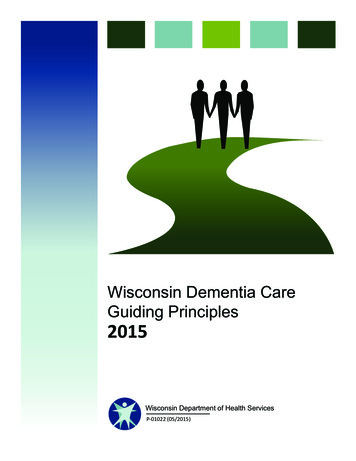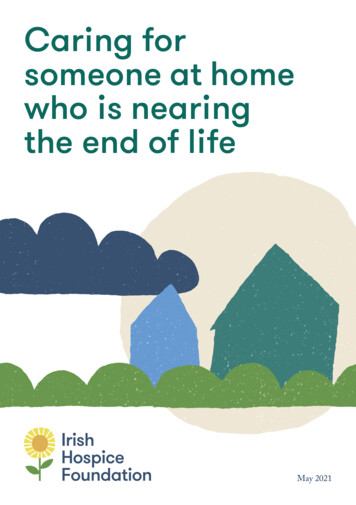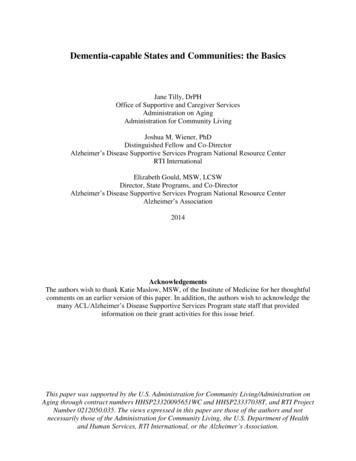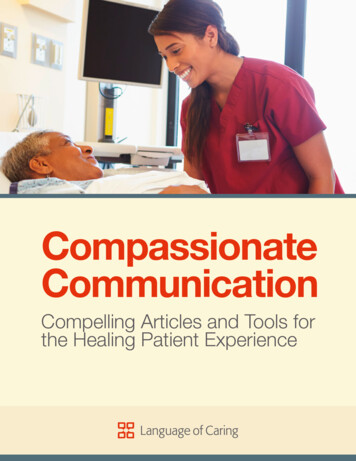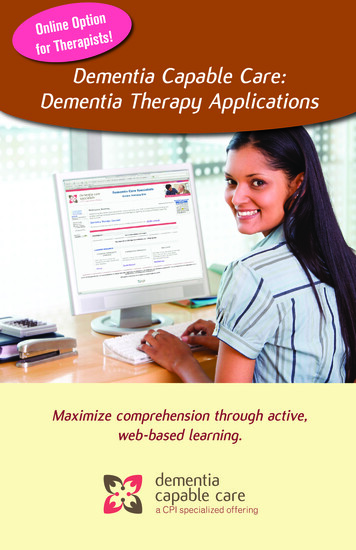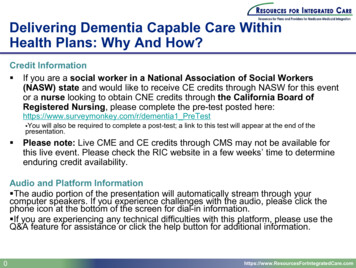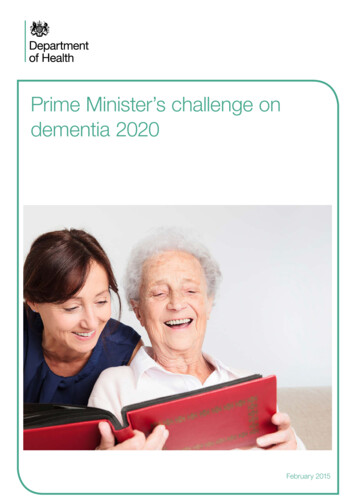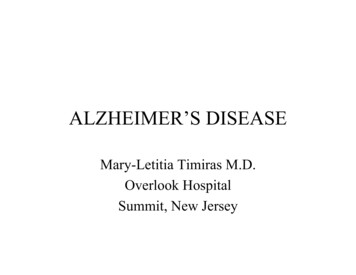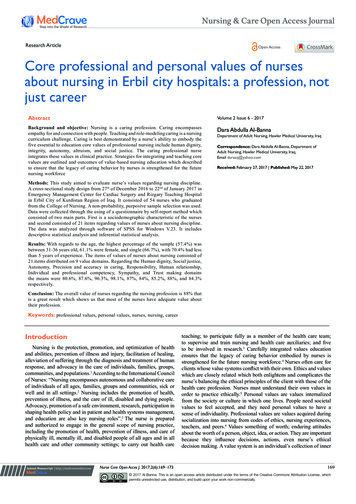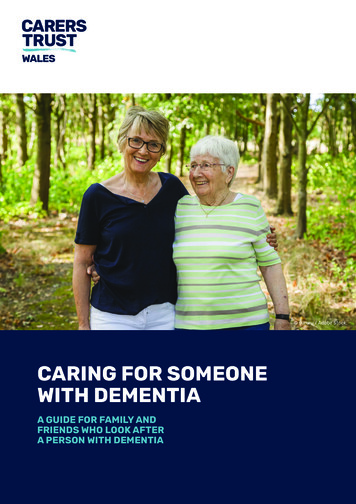
Transcription
sururu / Adobe Stock.CARING FOR SOMEONEWITH DEMENTIAA GUIDE FOR FAMILY ANDFRIENDS WHO LOOK AFTERA PERSON WITH DEMENTIA
ABOUT THIS GUIDEIf you are reading this guide because youcare for someone with dementia, you arenot alone. Over 45,000 people in Waleslive with dementia (Alzheimer’s Society),a wide range of symptoms caused bydiseases in the brain. There are 670,000people in the UK who provide practicaland emotional support to people withdementia, a syndrome that can causememory loss, communication problemsand mood changes.Unpaid carers including husbands andwives, children, siblings, friends and otherfamily members may help a person withdementia with daily tasks such as cookingand dressing, managing medicines andproviding emotional support.Caring is often rewarding but we knowthat it can affect a person’s health andwell-being, employment and personalrelationships. Access to good informationand support at the right time in yourcaring journey can be an enormous helpin making sure that the more challengingaspects of caring don’t impact on you toonegatively. In Wales, as an unpaid carer, youhave a legal right to information, adviceand assistance to help you in your caringrole. This includes support to do the thingsthat matter to you such as education,employment and maintaining hobbies.This guide gives information on a rangeof matters including what you can expectin the early stages of getting a diagnosis,looking after your own well-being andthinking ahead about financial and legalmatters.2To get the bestout of this guideDip into chapters over time, ratherthan reading it in one go.Click on coloured links to visitexternal websites where you canfind more information and support.Click on bold text to jump to adifferent chapter within this guide.45,000 people in Wales live withdementia (Alzheimer’s Society).One in 14 people over the age of 65have dementia (NHS).1 in 6 people over 80 have dementia(NHS).Nearly half of carers of people withdementia also have a long-standingillness or disability of their own(Alzheimer’s Society).
CONTENTS5About Carers Trust Wales6Carers Trust Network Partners in Wales7Understanding dementia8Getting a dementia diagnosis13Young onset dementia14Carers’ needs assessments21Your own well-being26Information for young carers28Paying for care and benefits30Claiming benefits for you and the person you care for34Caring for a person with dementia39Communication in dementia43Helping the person you care for to stay healthy and independent48Managing medicines50Carers and people with dementia from ethnic minorities53Work and caring54Help with caring57Care home options65Supporting the person you care for during hospital stays69Legal and financial planning72Planning for the future75End of life76Life after caring
ACKNOWLEDGEMENTSWe would like to thank all the carers who shared theirexperiences with us and helped to shape this guide.We are also grateful for the contributions of CarersTrust Network Partners and other organisations whocontributed their knowledge and expertise.In particular, our thanks go to the following individuals:Gwenno Davies, Carers Trust North WalesSuzanne Duval, Diverse CymruBeth Evans and Amber Powell, Carers WalesIan Logan, Ian Clark and members of Taith Ni Carers ClubPatri Masterson-Algar, Bangor UniversityIrene Mortimer and Liz Rees, Swansea Carers CentreLuke Pickering-Jones, NEWCISJudy Thomas, Community Pharmacy WalesFaith Walker, FW ConsultancySuzy Webster, Age CymruProfessor Alison Wray, Cardiff UniversityAuthor: Faaiza BashirPublished: September 2020All library photos are posed by models.We would like to thank The Shaw Foundation whokindly funded the production of this guide whichwill undoubtedly be an invaluable resource forunpaid carers in Wales.Age Cymru and Carers Trust Wales are working in partnership to develop personcentred service models to identify, and better meet the needs of older carersand carers of people living with dementia, funded by the Welsh GovernmentSustainable Social Services Third Sector Grant. This guide is being distributed aspart of this project and additional resources will be developed to support its useover the duration of the project.4
ABOUT CARERS TRUST WALESCarers Trust Wales exists to improve support, services andrecognition for unpaid carers in Wales. With our NetworkPartners - local services that deliver support to carers - wework to ensure that information, advice and practical supportis available to carers across the country.By working collaboratively, we inform andinfluence local organisations and decisionmakers who have the power to improvesupport for unpaid carers locally, regionallyand nationally.We also seek to influence decision-makers,the media and the public to promote,protect and recognise the contributioncarers make, and the support they deserve. pikselstock / Adobe Stock.5
CARERS TRUSTNETWORKPARTNERS IN WALESNetwork Partners in Wales offer a widerange of services for carers includingemotional support via things like talkingtherapies and weekly drop-in sessionsthrough to practical help such as access togrants and advice on benefits. Each serviceis different, so you’ll need to contact yourlocal organisation to find out more.Carers Outreach Servicewww.carersoutreach.org.uk01248 370 797help@carersoutreach.org.ukCarers Trust South East Waleswww.ctsew.org.uk01495 769996info@ctsew.org.ukCarers Trust North WalesCrossroads Care Serviceswww.nwcrossroads.org.uk01492 542212Swansea Carers Centrewww.swanseacarerscentre.org.uk01792 653344admin@swanseacarerscentre.org.ukWe keep the details of our NetworkPartners up to date on www.carers.orgCarers Trust CarmarthenshireCrossroads Carewww.carmarthenshirecrossroads.org.uk01554 754957 (Llanelli)01267 220046 S: North East Wales CarersInformation Servicewww.newcis.org.uk01745 331181 (Denbighshire)01352 752525 (Flintshire)01978 423114 ru01597 823 800info@credu.cymruBridgend Carers Centrewww.bridgendcarers.co.uk01656 658479enquiries@bridgendcarers.co.ukAs well as our Network Partners there is a range of help and advice available inall local authorities in Wales. You can find out more about these carer specificservices and contact details from Understanding your rights as a carer(Welsh Government).6
UNDERSTANDINGDEMENTIADementia is the name for a collection of symptoms causedby diseases that impact how the brain works. Dementiaisn’t a single illness or disease, although this is a commonmisconception.Dementia is a syndrome (a set of relatedsymptoms or characteristics) caused bydiseases that affect activities in a person’sbrain, including the following cognitivefunctions: memory,Understanding the type of dementia aperson is affected by and receiving anaccurate diagnosis means people withdementia and their carers can get the rightsupport. You can read in detail about thedifferent conditions here, including rarertypes of dementia. language, recognising faces and objects, and judgment.Dementia is not an inevitable part ofgetting older, but it is more common inolder people. Dementia is a progressiveillness (it gets worse over time) and thereis currently no known cure. Younger peoplewith dementia or ‘young onset dementia’refers to someone under the age of 65.The most common conditions are: Alzheimer’s disease,Further informationAlzheimer’s SocietyDementia UKNHSDementia is an increasingly commonsyndrome in the UK, affecting one in14 people over the age of 65 (NHS). vascular dementia, dementia with Lewy bodies, and fronto-temporal dementia (diseases thataffect the frontal lobe of the brain).People may have one dementia or acombination of the different forms anddiagnoses are not always clear-cut (WorldHealth Organisation, 2019).7
GETTING ADEMENTIA DIAGNOSISAn early diagnosis of dementia helps everyone get the care andsupport they need, as well as appropriate treatment. It allowsfamilies to have as much information as possible so that theyknow what to expect and can plan for the future. However,too often people are diagnosed late in the progression of thedisease or do not receive a diagnosis at all.There are many reasons dementia may notbe diagnosed early, including: Delaying visiting a health professionalbecause of fear and worry aboutsymptoms. Difficulty in noticing dementia symptomsif they appear gradually. Mistaking dementia symptoms as part of‘normal ageing’.8It is beneficial to visit a GP as soon asyou become concerned about possiblesymptoms of dementia. It gives doctorsthe chance to understand and monitorchanges in a person’s health and behaviourover time and rule out any other underlyingillnesses.Seeing your GP may help to get an earlydiagnosis. This is important because it mayallow the person you care for to: Multiple assessments need to be carriedout and these can take time. There isn’ta one-off test to determine dementia. Receive treatment to slow downdementia (in some cases). General Practitioners (GPs) may notbe confident to make a diagnosis, andtherefore they may need to refer to aspecialist for diagnosis. Know what to expect and plan for theirfuture. Access local support services.
First steps: visiting the GPThe first thing someone who is concernedthey may be showing signs of dementiashould do is visit their GP. Going to the GPwith the person who has symptoms willallow you to offer moral support and providethe GP with additional information.How to prepare Consider booking a double appointmentso you have plenty of time. Write a list of behaviours or symptomsyou are concerned about. Note howoften they are occurring and how longyou have been noticing them for. Thiscan help identify what type of dementiais present as some dementia developfaster than others. In turn, this can helpidentify which specialist help is suitable(Robinson et al, 2015). Make a list of questions but be preparedto not have them all answered in the firstappointment; diagnoses can take sometime. Family history is important. Make a noteof any diagnoses or illnesses you’reaware of, especially ones which affectmemory. Some illnesses are hereditary;they run in families. Bring along a list of current medicationand doses.What to expect atthe GP appointmentA doctor may: Check the person with symptomsconsents to you being there. Talk to the person and you about yourconcerns. Ask about family history. Consider other illness that may becausing symptoms or mimickingdementia symptoms, such as depression,deficiencies in particular vitamins orproblems with the thyroid(Robinson et al, 2015). Run the following examinations:- physical examination, including vision,hearing and movement,- blood tests and urine samples, and- cognition tests to determine mentalability including problem solving,memory and orientation.If your family memberor friend refuses tovisit the GPIf someone close to you is showingsigns of dementia but refuses to visitthe doctor, it can be worrying.Whilst a GP must keep informationabout their patients confidential thereis nothing stopping you from providingthem with information that they mightfind useful. This can help them to asksearching questions or to follow upwith the person you have concernsabout.You could also make sure you haveinformation about dementia and theimportance of early diagnosisavailable for the person you areconcerned about.9
Outcomes to a GP visit A diagnosis of dementia (and a referral toa dementia specialist for treatment andsupport). A diagnosis of another illness. A referral to a dementia specialist forfurther assessments. A suggestion to track symptoms andreview at a future appointment e.g. in amonth’s time.If the GP does not diagnosedementia or make a referralIf the visit to the doctor doesn’t result ina diagnosis, continue to keep a diary ofconcerns. If symptoms progress you canshare this with a doctor in future months.Dementia can take time to becomeapparent and some types of dementiadevelop slowly.I have tried toget supportfrom my GP butso far they justdon’t seem tounderstand.Reason for thisis that my wifedoes not thinkthat she needsany help so whyshould I? It’s nother fault but thatis the way it is.Carer of a personwith dementiaYou can also ask the doctor to explainhow they have reached their professionaljudgment. Understanding their reasoningmay help you to come to terms with thedecision.Some unpaid carers have described that itcan be difficult if the person with dementiahas convinced the GP that they’re well. Thiscan mean families end up at crisis pointbefore they receive a diagnosis and thesupport and treatment that comes alongwith this.In a situation where you feel the doctor isnot listening to your concerns, you have aright to ask for a second opinion. Find outmore here. Monkey Business / Adobe Stock.10
Referral to a dementiaspecialistA GP may refer patients to a specialistdementia unit called a memory clinic. Thereare 28 NHS memory clinics in Wales.A memory clinic is a team of professionalswho specialise in diseases like dementia.Health and social care professionals,who form the multidisciplinary team offerdiagnosis, treatment, advice and supportservices. The memory clinic may be a unitin your local hospital, or it may be a serviceprovided by the Community Mental HealthTeam.Staff in memory clinics may include: medical doctors such as geriatriciansand psychiatrists;What happens at each memory clinic variesbut examples of services include: assessments, including home-basedassessments, for people with symptomsof dementia; access to education and support forcarers; access to counselling; prescription and review of medication;and cognitive stimulation therapy. CST is aprogramme that can help people withdementia improve their memory andthinking skills to help them adjust tomemory loss (NHS England, 2018). psychologists; nurses who specialise in dementia; occupational therapists; speech and language therapists; and social workers. Robert Kneschke / Adobe Stock11
The wait between a GP referral and anappointment at a memory clinic varies.The national standard should be four tosix weeks, but may be longer. Speak toyour GP or the memory clinic if you areconcerned about the length of you havebeen waiting.You can ask for notes of the meetingin which dementia is diagnosed. Thedocumentation may be helpful foradministrative purposes and theremay have been a lot of information totake in.What further tests may be carried by amemory clinic? Cognition tests. Blood and urine tests. Brain scans.Common brain scans inmemory clinics-Further informationAge UKNHSAlzheimer’s SocietyComputerised tomography (CT or CAT)scans are carried out by radiographersusing x-rays and a computer. A personwill need to lie still on their back as thescanner passes over the body.- Magnetic resonance imaging (MRI) iscarried out by radiographers. A large tubecalled an MRI scanner uses magneticfields and radio waves to produce imagesof the body. A person will need to lie stillon their back and enter a large tube. Itcan last 15 – 90 minutes.- An electroencephalogram (EEG) iscarried out by a clinical neurophysiologistand records electrical brain activity.Small sensors are attached to the scalpwhich are connected by wires to acomputer. The procedure lasts 20 – 40minutes.- A single-photon emission computerisedtomography (SPECT) scan uses nuclearimaging to track blood flow and create a3D image of the brain. It can be used toinvestigate which parts of the brain arebeing affected by dementia.You can read more about tests here.12 Monkey Business / Adobe Stock.
YOUNG ONSETDEMENTIAYoung onset dementia refers to anyone aged 65 or under whohas dementia, and affects around 2,000 to 3,000 people inWales. Carers of people with young onset dementia benefit fromsupport that is bespoke for them.It can take longer for younger people withsymptoms to get a diagnosis of dementiaand there are far fewer tailored supportservices available. Younger people livingwith dementia are more likely to be inemployment, have dependent childrenand financial commitments (such as amortgage).As a carer of someone with young onsetdementia, you may face particularchallenges. The person you care for may choose notto continue employment, change theiremployment or be unable to continueemployment. This may affect yourchoices about your own employment too. A change in your family finances if theemployment of the person you care foris affected, or if your own employment isimpacted.Much of the information in this guide isrelevant for carers of someone with youngonset dementia but you may find sectionsabout getting a diagnosis, employmentrights and support for young carersespecially useful.Meeting other carers who may be familiarwith your experiences can also be reallybeneficial. You can find services for peoplewith young onset dementia, includingcarers groups that take place acrossWales here. For example, Cardiff and ValeUniversity Health Board run a service thatmeet regularly for activities, including amonthly walking group.YoungDementia UK is a UK-wide networkof people where you can find lots ofresources, information, advice for carers,and sign-up to regular newsletters. A change in your relationship withthe person with dementia (includingintimate relationships). A social and emotional impact on yourfamily, such as a change to your usualroutines, activities and social lives.You can read in more detail about theseissues on Alzheimer’s UK.13
CARERS’ NEEDSASSESSMENTSLooking after a person with support needs can impact oncarers’ health and well-being; employment or education; andpersonal relationships. In recognition of this, carers’ rights areprotected in legislation.The Social Services and Well-being (Wales)Act 2014 outlines the rights of carersas well as the rights of people who arecared for. It applies to people of all ages. Itoutlines what local authorities are dutybound to offer carers and the peoplethey care for. The needs and eligibilityfor support are identified though a localauthority carers’ needs assessment.Remember, health and social care are adevolved function in Wales. This means theWelsh Government, holds responsibilityfor health and social care in Wales. The UKGovernment does not hold responsibility forthese functions in Wales. Wales has a WelshParliament, and a Minister for Health andSocial Services. Other functions, such aswelfare benefits, are controlled by the UKGovernment. Find out more here.Impact of caringon older carersA disproportionate number of oldercarers go without the support theyneed because they do not identifythemselves as a carer.Research shows that caring can havea more detrimental effect on yourhealth, well-being and finances if youare an older person.Around 65% of older carers (thoseaged 60 to 94) have a long-term healthproblem or disability themselves.68% of carers say that being a carerhas had an adverse effect on theirmental health.A third of carers report that they havecancelled treatment or an operationfor themselves because of their caringresponsibilities.14
Key principles of the SocialServices and Well-being(Wales) Act 2014Voice and controlPeople should be at the centre of care andsupport.Prevention and early interventionPeople should get support before theyreach a crisis point.Well-beingPeople should be supported to reach theirown well-being goals.Co-productionCarers and people with care and supportneeds are encouraged to be involved indesigning services.The Act aims to promote well-being whichis defined it in a broad sense and includes: physical, mental and emotional wellbeing; access to employment, education ortraining; positive personal relationships;Rights protected underthe Act The right to have information, advice andassistance. The right to an assessment if your needscannot be met by information andadvice. The right to have your voice heard andhave control over decisions about yoursupport.Read Understanding your rights as acarer (Welsh Government).You can access information, advice andassistance about your caring role fromyour local authority. If this is not sufficientto meet your needs, you should beoffered a carer’s needs assessment. If theassessment reveals that you have needswhich meet the eligibility criteria, you havea right to support for them.An assessment is not compulsory andif you choose not to have one, you arestill entitled to information, advice andassistance. a social life; and safe housing. Racle Fotodesign / Adobe Stock.15
Carers’ needs assessmentsThe assessment is a formal conversationbetween you and the local authority todiscuss your caring role and your wellbeing. Sometimes the local authoritywill ask a carers’ service to complete theassessment on their behalf – it still holdsthe same weight. The assessment shouldinclude discussion about: whether you are able and willing toprovide care; whether you are able and willing tocontinue to provide care; outcomes you wish to achieve; whether you work or wish to do so; whether you are in education or trainingor would like to be; and leisure activities that matter to you.In the case of a carer who is a child,the assessment should include the Carers Trust 2020.16developmental needs of the child, andwhether it is appropriate for the child toprovide care in light of those needs.Read more about young carers here.A combined assessment can take place,where your needs as a carer and the personyou care for are considered at the sametime, but this should only happen with yourconsent.Each local authority in Wales offersassessments that fulfils the requirementsof the Act, but may carry out assessmentsdifferently and fulfil support needs withvarying services.If you are not eligible for support, youshould still receive information and adviceon local services that you can access.You can also request another assessment ifyour circumstances change.
Advice to help with yourcarer’s needs assessments Prepare for the assessment. To helpyou prepare, use the questions outlinedin Carers Wales’ factsheet. It alsooutlines how decisions are reached. Ask questions. During the assessment,ask questions if you are unclear.Your local authority should offer youinformation, advice and assistance. Bring someone with you for supportand confidence. You can ask to have afamily member or friend with you. You’realso entitled to have an independentadvocate with you at the assessment. Access carers’ services. Contacta local carers’ service (if there is oneseparate to the local authority in yourarea) to help you access and prepare forthe assessment. There may be a serviceto help complete forms too.I want support toknow what my lovedone is entitled toCarer of a personwith dementiaFurther informationabout carers’ needsassessmentsCarers UKDewis WalesSocial Care WalesAlzheimer’s Cymru Attend carers’ groups. Peer supportcan give you a chance to share concerns,hear other people’s experiences and gainconfidence. Your local authority shouldadvise you about local groups. Use the complaints procedure. Ifyou’re unhappy with the service, followthe complaints procedure of your localauthority. Find specialist support. If you havespecific queries, you can contactorganisations who may offer moreinformation. Consider Carers Wales, AgeCymru, Older People’s Commissionerfor Wales, Childrens’ Commissionerfor Wales, or an organisation thatspecialises in specific illnesses such asAlzheimer’s Society or MS Society.17
Offer of supportIf you are eligible for support you shouldreceive: a care plan for you that you will need tosign; an offer of support based on youreligibility; information on practical supportavailable for you; information on any benefits or grants youcan apply for; and information on carers, groups andvoluntary services you can access.You may have to pay for some parts of theservices that you are offered, dependenton your needs and financial circumstances.This is discussed in more detail here.Some of the support on offer may bedependent on the person you care forhaving a needs assessment (if you have nothad a joint assessment).Types of support that may beoffered to carersThis information is taken from CarersWales’ factsheet. Information about local carers’ groupsthat can support you. Support to improve your health and wellbeing, e.g. gym and leisure classes. Support at home, e.g. help withhousework or gardening. Help with your transport needs asa carers, e.g. a taxi fare for medicalappointments. Equipment to help you accessinformation as a carer, such as a laptop.Types of support that maybe offered to people withdementia Meals delivered to the person’s home. Laundry services. Adaptations to the home, such as a grabrail. Personal care at home. A temporary stay in a residential home ora place at a day centre so that the carercan have a break. Read more aboutrespite here. diego cervo / Adobe Stock.18
Planning for emergenciesUnexpected changes in your life maymean you are unable to carry outcaring duties temporarily. Preparingfor emergencies will give you and theperson you care for peace of mind.Here are some ideas to help you plan: If you haven’t had one already,consider a Carer’s NeedsAssessment as assessments caninclude discussions about emergencyplanning. Prepare your own Emergency CarePlan detailing information aboutthe person you care for. The planshould lay out the key informationsomeone who is caring for the personyou care for may need to know. Youcan include medications and healthinformation, information aboutmobility, diet and communication,contact details for health and socialcare professionals and any otherinformation you feel is relevant. Tryto keep this up to date and share thedocument with family and friends, aswell as a social worker, care worker orPersonal Assistant if you have one.Read more on Carers Wales’ andMarie Curie’s webpages. Ahead of time, speak to familymembers, friends or neighbourswho are willing to help you in anemergency. If you think the personwith you care for would be happy tocall for support, write the contactdetails of each person somewherethat is visible, or easy to access. Keep the contact details for your localadult social service team handy, sothat they’re easy to find should you orthe person you care for need them. Your local carers service may beable to help you talk through optionsand prepare a plan. Some may havetemplates and guidance to assist youtoo. Visit Understanding your rightsas a carer (Welsh Government) foryour local services and details of eachlocal authority’s Information, Adviceand Assistance services.19
SPOTLIGHT ON SWANSEA CARERS CENTREHelping carers planning for emergenciesLiz Rees and Debra Evans areHospital Outreach Project Workersat Swansea Carers Centre, aNetwork Partner of Carers Trust. Lizand Debra guide carers through thepractical and emotional challengesof caring for a person who is inhospital, and help carers prepare foremergencies.to care unexpectedly. We offer carersadvice and a template for emergencyplanning that’s available on ourwebsite. Carers make preparationsbased on this and complete the formwhich allows them to rest assuredthat plans are in place for their familymember. We’re on hand to talk throughthe plan and discuss any specificworries carers may have. We offer‘Carers worry about what would happen reassurance, guidance and signpostto the person they care for if theyfamilies for specialist support ifthemselves are taken ill or hospitalised needed’.meaning they find themselves unable Carers Trust 2020.20
YOUR OWN WELL-BEINGCaring for a person with dementia can be full of positiveand rewarding experiences, but it can also be physically andemotionally challenging. Looking after yourself by takinga break, staying healthy and doing things for yourself isimportant.Many people juggle their caring role withemployment, education, a young familyor other responsibilities. Managing yourtime and relationships can cause stressand affect well-being. It’s normal to feelfrustration, resentment or guilt at times,and experience good days and bad days.The emotional impact of seeing dementiaadvance in a person can also be significant,especially as the illness can progressunpredictably at times. Carers find itdifficult to see the loss of independenceand autonomy of the person with dementia.You have legal rights through the SocialServices and Well-being (Wales) Act2014 to help you have a life alongsidealong caring.68% of older carers stated that caringhas had an impact on their mentalhealth.Around 65% of older carers have along-term health problem or disabilitythemselves.A third of carers report that they havecancelled treatment or an operationfor themselves because of their caringresponsibilities. MIHAJLO CKOVRIC/Stocksy / Adobe Stock.21
We have outlined ideas to help youmanage your health and well-being.Be openTalking about how you feel can help youfeel heard and understood. You can releasefeelings safely and a different perspectivemay bring ideas for new ways to approachyour challenges.You can talk to an empathetic friend, familymember or neighbour who you trust; youmay be surprised at how supportive theyare. People may offer you help if theylearn you need it, such as to check in onthe person you care for in an emergencysituation.You can talk to a health or social careprofessional too, such as your GP, a nurseor staff at a carers service. They shouldlisten to you and give you the informationand advice you need. Don’t worry aboutsharing negative or difficult feelings;professionals are used to hearing aboutcommon challenges and are there to offerempathy and support. If they can’t help,they should direct you to an organisationwho can.If you are in emotional distress, strugglingto cope, or at risk of suicide, call theSamaritan’s for free on 116 123 at anytime of day or night.Carers’ services andsupport groupsCaring for someone with dementia can bean isolating experience, as both dementiaand the
5 About Carers Trust Wales 6 Carers Trust Network Partners in Wales 7 Understanding dementia 8 Getting a dementia diagnosis 13 Young onset dementia 14 Carers' needs assessments 21 Your own well-being 26 Information for young carers 28 Paying for care and benefits 30 Claiming benefits for you and the person you care for
